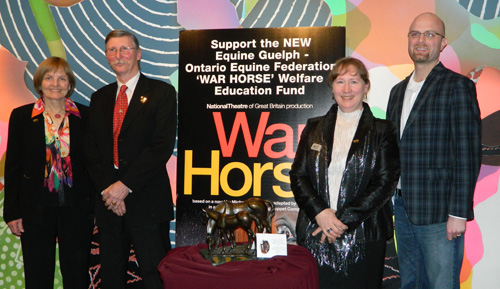
How do you stage a play about horses without using live horses? For the Mirvish Productions show War Horse, the answer was to use puppets. But not your ordinary puppet made from a sock or paper bag; the horses in War Horse are life-sized and controlled by three people – two for the body and one for the head.
To make the horses realistic, the puppeteers spent many hours watching videos of real horses, and the result is impressive. The puppet horses breathe, use their ears expressively and move with recognizable gaits. It’s easy to forget that there are people inside the horse’s frame – although they are always visible – and to think of Joey as a “real horse.”
Members of the University community and supporters of Equine Guelph saw the production and inspected the War Horse puppets up close during a gala fundraising event March 8 at the Princess of Wales theatre in Toronto. The event helped to kick off a partnership between Mirvish Productions and Equine Guelph to support the Equine Guelph-OEF War Horse Welfare Education Fund.
Each ticket purchased through the partnership will return $10 to the education fund to support the development of courses that teach horse care and welfare. As Equine Guelph director Gayle Ecker says: “Education means well-informed caregivers and healthier horses.”
Participants at the War Horse gala were able to ask questions of the designers from the Handspring Puppet Company, the South African company that created Joey for the Mirvish production. The life-size and life-like handspring puppets allow the actors and puppeteers to transport their audience back to the First World War – a time when horses were integral to progress but welfare conditions were often challenging.
The stage adaptation examines the horse-human bond and leaves the audience considering the ability of live horses – and the War Horse puppets – to communicate without words.
If you weren’t able to attend the gala, you still have the opportunity to see the show and support the Equine Guelph education fund. Mention the War Horse Welfare Education Fund when you buy tickets for shows before May 6 — use the code WHFUND when buying online — and $10 will be donated to Equine Guelph. As a thank you, you’ll receive a complementary CD featuring music from the play when you pick up your tickets.
